
The EU’s Dangerous Balkan Negligence
The relationship between the EU and the Western Balkans has been an unsteady one, to say the least. Of the six countries in the region – Montenegro, Serbia, Kosovo, Bosnia, Macedonia and Albania – only Serbia and Montenegro have begun accession talks with Brussels, as the EU has come to increasingly neglect the region as Brexit and other internal crises took up its political bandwidth. In that sense, Albanian Prime Minister Edi Rama’s visit to Brussels last week to push for the start of EU accession talks, was like a blast from the past. But with Rama’s government facing allegations of corruption and links with organized crime, it also demonstrated how EU policy towards the Western Balkans has become dangerously frayed.
Since the Yugoslav wars of the 1990s, the EU has sought to stabilize the Balkan region, primarily by offering a “membership perspective” to its countries, on top of structural funds – an approach best described as a carrot without the stick. One of the four regional candidate countries, Albania, is especially keen to progress to the next stage. In the run-up to Rama’s meeting with EU Council President Donald Tusk, however, the Albanian opposition made a number of claims that the government was colluding with organized crime groups. Though Tusk did not respond to the allegations against his guest, his message was simple as it was clear: without improvements to the rule of law, Albania will not progress to formal negotiations.
For Western Balkan countries stuck in the EU’s waiting room like Albania, the hopes of further European integration appear increasingly distant. EU leaders have little interest in the combustible region, which never appears far from a new crisis. Certainly, the EU has been keeping busy with a number of other issues, from Brexit to Eurozone reform to the refugee crisis. And with member states experiencing enlargement fatigue, there is little appetite to expand the Union anytime soon.
However, forgetting about the Balkans could prove to be a tactical mistake in the long term. By disengaging from the region, Brussels is refusing vital guidance and oversight in the form of an effective accession process, with the result that the region is rapidly slipping back into bad habits. In fact, European unwillingness to expend meaningful political capital on the region has only exacerbated pre-existing resistance to reforms.
Macedonia, for instance, showed promise for several years but reform efforts have stalled. The country faces an uphill battle to move to official membership, not least because of recent political turmoil. In November, Enlargement Commissioner Johannes Hahn helped negotiate a way out of a constitutional impasse, which eventually led to a peaceful transition of power to new PM Zoran Zaev. But whether reforms will regain momentum remains to be seen. Meanwhile, Federica Mogherini, head of the EU’s External Action Service, has overseen several meetings between arch-rivals Serbia and Kosovo, though no side is closer to resolving the ongoing territorial conflict.
As a result of such foot-dragging, both the EU and Western Balkan countries are losing trust in each other. As governance issues remain unaddressed, the political classes in several West Balkan countries are drifting towards authoritarianism and corrupt governance. The outcome is cynicism towards the EU and deteriorating living conditions for many citizens in the Western Balkan region. The lack of movement over European integration has caused a decline in public support for the EU across the Western Balkans.
Bosnia and Herzegovina, for example, have been trapped in post-conflict inertia since 1995 and desperately need a positive vision to offer its citizens. Meanwhile, Albania has become a regional hub for the production and transit of drugs. Alleged links between drug gangs and the Albanian establishment, as well as money laundering and broader corruption, suggest a deep crisis of governance and legitimacy.
Tragically, such backsliding also affects Montenegro, the region’s most advanced country in terms of EU accession. Montenegro joined NATO last year amid political chaos caused by contested parliamentary elections. During the October polls, Milo Dukanovic was accused of having created an atmosphere of intimidation and engaging in voter fraud to steer the elections in his favor. To protest their criminalization and electoral outcome, the opposition parties entered into a parliamentary boycott that lasts to this day. A EU delegation in September tried to broker a truce but failed due to the government’s stubborn refusal to agree to snap elections as demanded by opposition leaders.
As if this was not already bad enough, a spate of violence related to organized crime is adding to the state of emergency in the country. The conditions are exacerbated by low conviction rates for gang-related murders. Together with Serbia, where gang violence has been on the rise as well, authorities have solved merely four of 83 murders since 2012. The reason is deeply chilling: organized crime and state institutions are often intertwined, meaning the state willingly turns a blind eye to crime, or, at the very least, is unable to enforce the law. In the case of Montenegro, the Dukanovic government is increasingly unable to provide basic security and stability required for joining the EU.
The current regional political climate reveals that the Balkans now need EU support more than ever before. Brussels needs to make important decisions concerning the Western Balkans – re-instate stability along its periphery, or remain passive and see problems escalate. Merkel’s rare interventions over Serbia and Kosovo have usually been effective, while Macron – who visited the region in the summer – set out in a speech in September that a “sovereign, united, democratic Europe…could gradually expand to include the Western Balkan countries.”
The best way for countries such as Albania, Macedonia and others to improve the lives of their populations is through genuine, mutual engagement and increased European scrutiny of the actions taken by their governments. However, for this to happen, Balkan countries need to be shown that internalizing the EU’s values will go a long way towards improving governance, tackling corruption and achieving prosperity.

